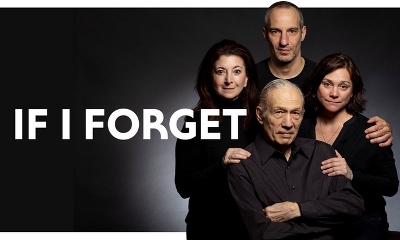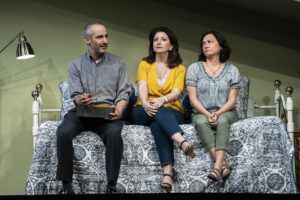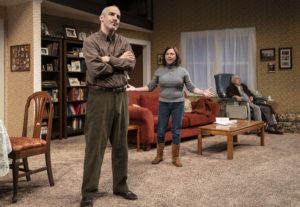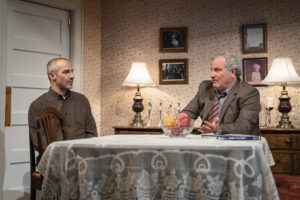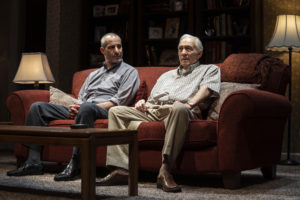THESE CASCADING CRISES
ARE NOT SOON FORGOTTEN
Sometimes, given the right writing, a seemingly small struggle can defy and define supposedly close kinfolk — and even stamp a society: The future of a storefront in a changing neighborhood, owned by one family since 1947, triggers a searing and complex conflict in If I Forget.
Steven Levenson’s engrossing drama proves as wide-ranging as it is domestic. First produced in 2017 by Roundabout Theatre Company, this Chicago premiere by Victory Gardens Theater, corrosively staged by Devon de Mayo, does full justice to a hard-hitting, red-meat play about a Jewish-American family in ferocious flux just before 9/11.
It’s set in the plush parlor of a white colonial house in Tenleytown, northwest Washington D.C. (beautifully appointed by set designer Andrew Boyce), on July 29, 2000 and, in the second act, February 18, 2001. The pell-mell action depicts the implosion of the Fischers, loved or unloved ones, in-laws and children, seen and unseen. Like such superb clan chronicles as Awake and Sing! or All My Sons, Levenson’s two-act connects (and disrupts) a lot. It yokes seven relations to their better and worse selves, as well as past to present, immigration to integration, and America to Israel.
Embattled from the start, the human vortex in If I Forget is Michael Fischer (Daniel Cantor, firing on all cylinders). He’s a liberal (and assimilationist) professor of Jewish studies who has a huge axe to grind. About to be published, his perversely provocative book Forgetting the Holocaust forcefully argues that American Jews have been manipulated into mindless support of an increasingly nationalistic Israel (and its putative persecution of Palestinians) by the Zionists’ artful exploitation of the guilt of genocide. Unsurprisingly, Michael has become the target of concerted opposition and a growing petition to deny him tenure.
His family is, of course, equally upset by Michael’s supposed betrayal of the homeland and his reduction of one people’s appalling suffering to an abstraction. Accordingly, Michael’s 19-year-old daughter Abby, currently making a fraught pilgrimage to the Holy Land, is torn between her father’s atheism and her quest for a religious legacy. Her plight indicts the future as much as it pillories the past.
Michael’s siblings are distraught for reasons unique to each: Though seeking love outside the faith, spinster schoolteacher Sharon (combustible Elizabeth Ledo) defends tradition. This spitfire sister also lambastes Michael for not being there to take care of their late mother or, right now, helping with the ailing 75-year-old patriarch Lou (magisterial David Darlow), a WWII vet who feelingly remembers the liberation of Dachau. Troublemaking, pill-popping Holly (Gail Shapiro, engaged and engaging) is furious over the dispensation of the Fischer’s store, which she hopes to take over from its Spanish tenants and turn into a “Spaces and Places” interior-design outlet.
Caught in the crossfire, and so much collateral damage, are Michael’s goy wife Ellen (Heather Townshend), a peacemaker agonizing over Abby’s uncertain future; Holly’s husband Howard Kilberg, a lawyer who has financial secrets to hide along with a threat from the Internet; and his son Joey (a feckless Alec Boyd), a drifting slacker trying not to take sides.
Given these seven scrappy souls, it’s amazing how well and how much Stevenson — and director de Mayo — up the ante, raise the stakes, and escalate the emotions: One squabble builds on the next quarrel, reaching an impasse over the future of a much-contested store, the symbol of the Fischers’ continuity or collapse.
Along the rocky way, like Tevye the milkman on the cusp of change, we feel the pain of “progress,” knowing that imminent terrorist assaults on Washington and New York will force issues of familial loyalty and anti-Semitism into a terrible new context.
By far the most incendiary element in If I Forget, a title that ironically echoes the name of Michael’s screed, is its polarizing attack on of the Holocaust “grief industry”: It’s condemned as a self-interested appropriation of the suffering of six million for political purposes. As Michael says, “I don’t believe in ghosts!” But by play’s end Michael’s bitter accusations are mollified by a haunting poem of Hebrew remembrance.
In isolated spotlights it’s intoned by the entire extended family (including stroke-ridden Lou): Ostensibly written by the unseen Abby, it’s a passionate evocation of a once and future Jerusalem, both violent and visionary as it’s “swallowed back into the sand.”
Levenson rightly ends his eviscerating group portrait with the cumulative weight of history. It’s a force field to give 140 minutes of concentrated calamities a powerful perspective. Lest we forget’¦
photos by Liz Lauren
cover photo by Todd Rosenberg
If I Forget
Victory Gardens Theater, 2433 N. Lincoln Ave
Tues-Fri at 7:30; Sat at 3 & 7:30; Sun at 3
ends on July 7, 2019
for tickets, call 773.871.3000 or visit Victory Gardens
for more shows, visit Theatre in Chicago
